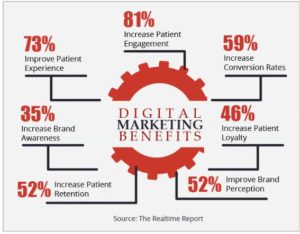Disclaimer: This is one of the industry sectors that we specialise in as an agency. We’ve been helping clinics grow and strengthen their online reputations since 2013.
Whatever marketing methods you decide to deploy, the key to successful Aesthetics Clinic Marketing is to know your audience – from there you can establish a strategy. Striking, and memorable is what you’ll need to be to stand out in such a crowded market. You’ll need to identify and communicate your USPs (unique selling points) and core brand values, in all your communications.
Important factors that assist in creating a strong brand foundation and presence. Tell your story, using social media, blogs and of course your primary brand asset: your website. Share your patients’ stories too. Create relatable content that people can connect to. Blogs are a strong marketing tool to educate, inspire and generally engage with your clients in an interactive way. Blogs are accessible almost anywhere via smartphones and tablets, so there’s a realistic chance of building a loyal visitor base that will directly translate into bookings. Don’t forget direct emails and calls to your patients whom you have already consulted or even treated; a retention strategy is key. Find out what else your patients are interested in and keep a record of when their next appointment is due. Personalised service will stand out in a world where many faceless brands exist and to them you are often just another number. Your front of house team or even the aesthetician who treated the patient can be the one to touch base, whoever already has started to build a relationship.
Make sure your clinic represents your brand in every way and at every touchpoint. Your staff, the colour of your walls, the music you play, the flowers and even the lighting. All of it matters. If you’re premium, everything has to be else your patients will be confused. Creating a strong brand is a long-term marketing technique and the foundation for everything else. If you don’t know who you are then how will you communicate to – or even identify – your TA (target audience).
Ultimately, a brand is a perception of a business that exists in the minds of your clients and it can take a while to build a positive brand image, not to mention if it gets damaged along the way. These days as we know the consumer has more power than ever and brands are now having to operate with a greater degree of accountability and transparency.
SEO, ORM, PPC- The Holy Trinity
Once you’re clear on your brand and have your foundations strong, you’ll need to increase your chances of being found by your TA. Everyone needs a presence on Google (and the various other search engines), and for this you’ll need to hire a team to carry out SEO, to maximise your chances to appear on the first pages of search engines. Two other things go hand in hand with this and those are ORM (online reputation management) and Digital PR: to show your business as ‘popular’ and ‘reliable’ by creating publications that concern it available in the digital sphere. There is the chance that if you create strong shareable content that the more people who access it, the more it is shared amongst their own network.
The key is also to establish yourself as an authority / thought leader in your field – this builds trust, and this industry in particular is largely dependant on trust and positive relationships. Websites such as Quora and Real Self are also great places for you to contribute to discussions, answer patients’ questions and in turn generate more traffic for your website. PPC (Google Ads) may be worth considering as these bring in traffic fast. But be wary of relying solely on these as when you stop your campaigns so does the stream of traffic to some extent, and if you haven’t been working simultaneously on SEO then you lose visibility too. SEO is what we call a slow burner – it takes time to build, but if done right it forms the foundation of all your other marketing activities.
Traditional Marketing vs Digital
Back in the day companies had to rely on expensive advertising methods such as radio and print ads in newspapers, and then later TV and magazines etc. Now these are by no means obsolete, however, as the world moves toward a digital marketplace, the main way to expand your reach is now through digital marketing tactics.
Industry statistics show that digital marketing does work, regardless of your specialty or clinic size, in attracting – and converting – new leads and connecting with existing patients:

COST- Are you looking at it short term or in it for the long haul?
Not every clinic have significant marketing budgets. But if your brand is in it for the long run then it’s wise to deploy a strategy that is in sync with that. The right digital team/agency will be crucial to a consistent and persistent style of brand building. Sometimes entrepreneurs or brand owners can be myopic and look at fast gain or quick results or cheaper costs without really taking into account the damage it can do over a long run. It is crucial to be able to discern a trusted digital team as versus the riff raff.
However, digital marketing has leveled the playing field for everyone. There are many tools for varying budgets such as local online listing management (Yell.com, Yelp.co.uk etc), content marketing (newsletters, blogs), search engine optimization (SEO), PPC and social media marketing. Not only is digital marketing cost effective, highly trackable it also offers a global reach.
Digital marketing is also great for interacting and engaging with patients, whose demands are continuously changing and evolving. You must be aware of trends, latest innovations etc in order to stay ahead of the game. Social media for instance offers insights into your patients’ preferences and lifestyles as well as what is trending.
In summary, evolution is necessary. If your clinic isn’t growing, you’re bound to fail sooner or later. You simply cannot rely solely on outdated marketing methods anymore. Whatever you do marketing wise make sure you track it effectively so you will know what’s working and what’s not. Don’t try to do it all on your own, you will need expertise and support.
The author of this blog is Rosalie Nicholson, Co-founder @Elixir. Having spent around 8 years in the Aesthetics/Beauty industry in the UK, her insights come from her own experiences working with various brands in London. She loves connecting with people, and is passionate about communication and marketing within the industry.
Contact us to see how we can help you: [email protected]
